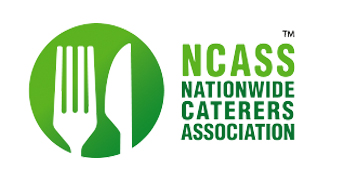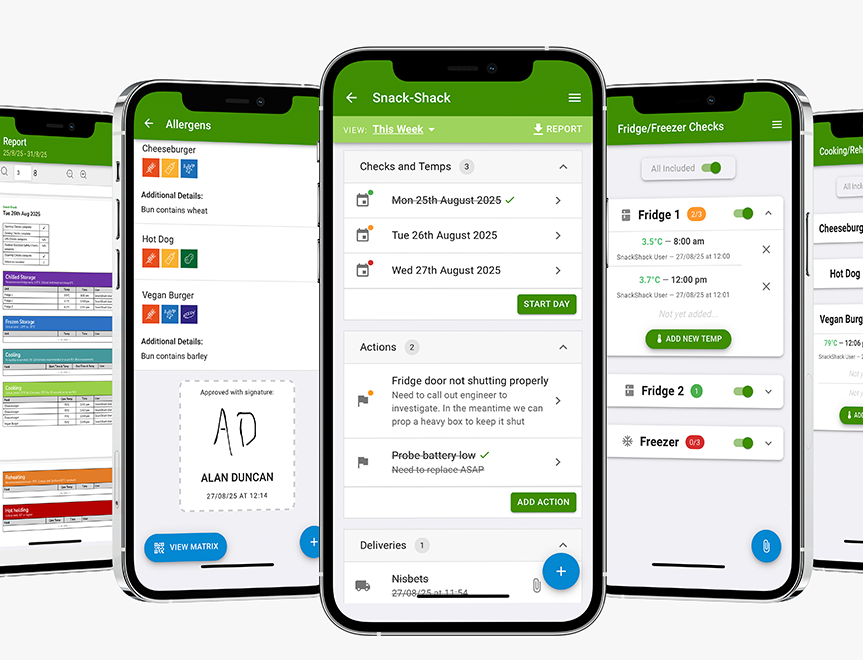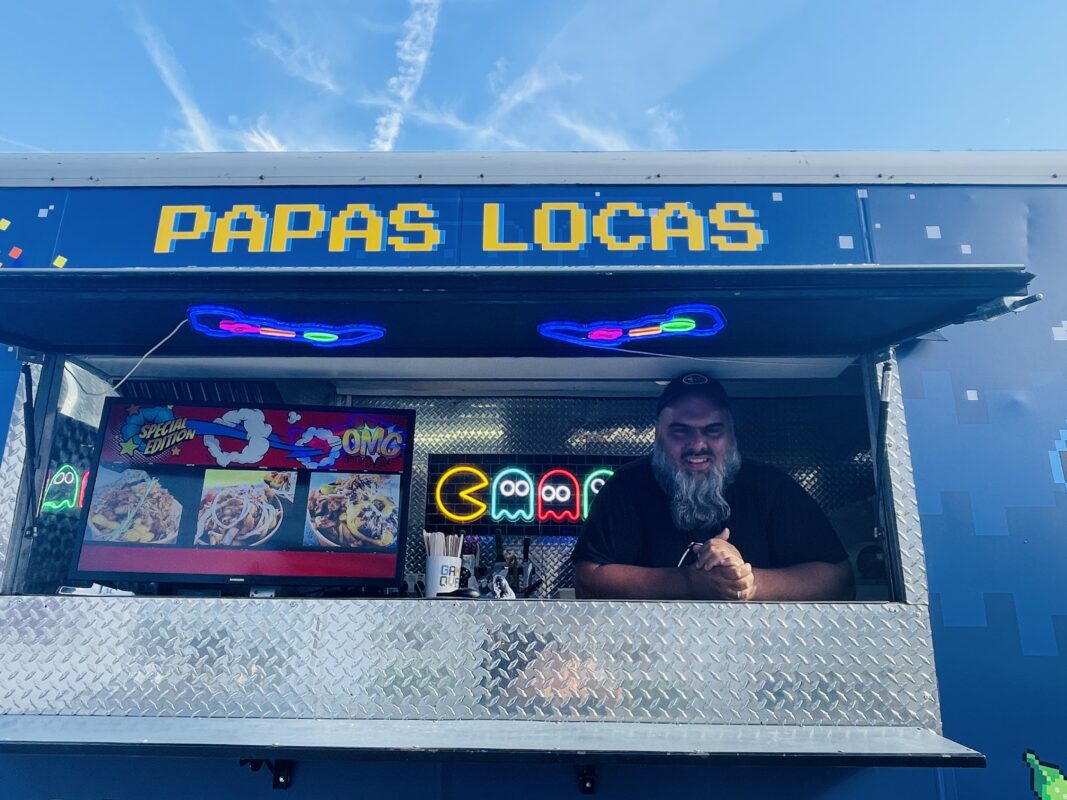Traditionally a Canadian dish of Québec origin, poutine is a dish gaining traction in the UK thanks to mobile traders Papas Locas. The combination of crispy fries, cheese curds and gravy is a dream assortment for any tongue – but it is the versatility innate to poutine that really helps it stand out. Poutine lends itself to creativity and innovation, which is exactly what Papas Locas love about it as they strive to expand horizons with the meal.
Having recently won an award celebrating their success with this product, we caught up with them to find out more:
Congratulations on winning the Velvet Magazine Street Food / Pop-up of the Year! Tell us how it came about:
The awards have been going on for a couple of years now. They cover the distribution range of the magazine, which is Cambridgeshire, Suffolk and Bedfordshire.
People are asked to nominate their favourite businesses in the different categories, Street Food/Pop-up of the year being one of them. So you get the nominations in and then the three businesses with the most nominations go to the final. In the final there is an expert judge in each category. This expert judge basically visits the three nominated businesses to experience for themselves and they publish a series of criteria beforehand as well. So it’s all transparent and objective.
They announce the winner at the ceremony, so it was quite a surprise for us. It was an incredible moment. The expert judge for our category was Pina Broccoli Anaia which was really nice because she’s of Canadian origin so knew exactly what we were talking about and trying to deliver with poutine.
Pina is quite close to what I want our truck to be as well. She’s multicultural, she’s a polyglot, and our van has kind of this concept of being a multicultural cuisine-based food truck.
Was it something that came as a bit of a surprise to you to get nominated for it?
Absolutely – I did post a couple of times on our socials for people to nominate us, but definitely did not expect that we would go into the final three, especially because we are operating in an area with many food trucks and street food pop ups so the competition is fierce. There are food trucks that are much bigger businesses than us, or have been operating a lot longer than us. So yeah, it was a big surprise, actually. I’d never have thought that we little ones would get to the final. And especially if you think about the fact that we are working with a lesser known cuisine!
It’s not, for example, pizza, BBQ or burgers – dishes that everybody knows – it’s quite a unique concept we work on, so it takes some time for people to get familiar with it. Maybe because we are bringing something quite different, it worked in our favour with these awards.
For someone that doesn’t know, can you explain exactly what it is you mean by poutine?
Poutine is traditionally a Canadian dish. It was introduced in Québec, in Canada around the 1950s. It is a concoction of French fries, cheese curds – we have to be very specific about the fact that it is cheese curds, not just any old cheese – and gravy. It’s as simple as that.
But obviously balance is quite important here. We put a lot of emphasis on sourcing top quality materials first. It’s absolutely key to source quality ingredients. The good thing about it is it’s delicious by itself, but also it is very easy to play with. As a dish it lends itself well to some creative input. You can effectively turn it into anything you want with the toppings. This is what we love about poutine and where we try to create new things with the dish.
One of the biggest challenges for us is to get the right ingredients as it’s quite specific. You have to go to a specialist cheesemonger that produces cheese curds that have exactly the texture and the flavour profile that you’re after. We were lucky enough to have found suppliers who can help us, but also it’s a single point of failure as well, so it is not easy and you need to be prepared.
Do you think there is a ‘sanity limit’ in terms of how loaded poutine can be?
I don’t think you should go easy on the toppings. I mean that’s why we call our van Papas Locas actually. Papas Locas means ‘crazy fries’ in Spanish, right? It is a dish served in the Canary Islands, which is basically the Canary Islands version of loaded fries and the way we see it is you have to go loco/crazy with your toppings but it can also depend on how the customer is feeling at any particular time:
You might be in the mood for something light. Sometimes you might be in the mood for something really hearty and put anything you want on it. It is a treat, so I don’t think there is a limit, no.
Was it always the plan to own and run your own street food business?
Nick: Yes – before this business, I had another food truck where the focus was Greek street food. Because we travel a lot and have a big interest in different dishes and cuisines in the places we visit, we wanted to do something more creative and more interesting for us. We wanted a vehicle to allow us to explore more, so I find that poutine gives us the opportunity to do that.
We are always trying new things and changing our offerings, like with our specials where we try to incorporate elements from different countries. We’ve had Mexican, Japanese, Spanish, Greek, Korean – we persist with looking to see what more we can do, how else we can change and just be creative with what we offer.
How have you built up an audience base?
We’ve been running this truck now for two and a half years.
For the first like 6-8 months we ran things part-time and looked to slowly build it up.
It’s been a lot of hard work, but also we’ve been lucky enough to be given opportunities at big festivals and some really nice events that have been really well organised. We tried to get as many people familiar with our product as possible and introduce them to our philosophy, to the way we create recipes.
For a long time the emphasis was on us finding the customer, approaching people and trying to establish ourselves, and it’s not always straightforward to do so. You have to remain consistent with what you offer, with your product and how you present yourself to customers and you can get to a point where we are now where people approach us, that we are better known and people actively seek us out and want to eat our food.
Feedback is so important along the journey, you know customers will always give you feedback – both on what they like about it and maybe what they think could be different. It’s necessary to listen to the feedback to help you improve and make the product better all the time. To get really positive feedback is so rewarding for us, to hear how people are enjoying our food gives us confidence in what we are doing.
Getting recognition from our customers is paramount, but also to get this from event organisers and industry experts – this is why the Velvet magazine award was so meaningful to us. It was humbling to have been nominated because that meant people took time out of their day to actually fill a form and write a few words about us. Then with a judge who has such depth of knowledge and experience of the sector to value us so highly – it shows we’re doing something right and means so much.
Talk us through the difference between poutine and loaded fries?
Poutine is the dish from Canada that we described: chips, cheese curds and gravy. Our loaded fries incorporate other cheeses like mozzarella or feta cheese and other warm sauces like curry, cheese, peppercorn sauce or others.
When it comes to what loaded fries really are, there is a lot of misunderstanding. People think of loaded fries as more of a side, whereas poutine and loaded fries at our food truck is a proper, substantial meal at a better price point than comparable filling dishes.
It also seems the general impression is that loaded fries are just some cheap chips with some cheese or bacon thrown on top and paired with low quality mayonnaise and ketchup. And when we give our customers something like our fries with our signature seasoning, our homemade proper cooked meats with handmade warm sauces, then they see exactly what loaded fries are supposed to be.
The problem is a little bit that not only customers but also food truck operators think they’ll just throw some things on top of fries, brand it as loaded and that’s it. A cheap win. It works against what we’re doing and when we were starting out, this was one of the biggest challenges: To convince people of the difference and that what we’re offering is worth them trying.
But that’s okay because it provides a clear contrast; when people try our poutine or loaded fries, they won’t be confused about this again. And it’s quite telling that what we’ve been doing works, because we have a lot of regular customers who follow us around to get our food.
How do you think that your poutine would go down in Canada?
Well, I think judging by the comments and the feedback we’ve been getting from all Canadian expats here, I think it would go down really well.
This is like the number one comment that we get, because people come to us, ready to be disappointed –they see poutine on the menu and they come ready for disappointment as not many establishments serve poutine to the ‘Canadian standard’. And they’re so pleasantly surprised when it resembles what they would get at home. We know exactly how they feel because us being Greeks, we feel exactly the same way about Greek food here.
We’re very harsh judges – I know that if someone gives me a Greek salad with white cheese and it’s not feta – I’m going to complain. It’s exactly the same thing.
So what’s the plan for the future?
We need to start thinking about funding because now demand has grown a lot. I think that’s the most obvious first step. And then the plan is to keep developing the recipes. In the two and a half years we’ve been operating, we’ve done about 15 specials and our menu has evolved massively from the first day that we started out until today and we want to be able to incorporate lesser known cuisines into our menu.
Countries in South America and Asia for example, where we can try to bring their flavours into our dishes. We’ve made a start with our special sauces because we have sides like chicken bites and we create unique sauces with flavours from Korea, Japan and elsewhere. We love playing around with ingredients from different cuisines and delivering something unique, which is the creative part of things we both enjoy. So yeah, I think it’s probably expanding the business as well as our repertoire of recipes.
We’re very proud to be the first and only poutine truck so far in Cambridgeshire and surrounding counties. And yeah, we’ve been blessed with some really good collaborations and we hope to have a lot more.
What does success look like for the business?
I think the first step is that when you start the business like this, you are looking for new places all the time. You send applications for events and at some point this starts coming the other way around, when events reach out to you. We’ve reached that point now which is a big positive and hopefully the business will continue to blossom in that sense.
Ultimately, we want to be the first thing that comes into people’s minds. The van will be at its highest point when people will think of us every time they want to have something different for their event, something creative and they think ‘we need to call Papas Locas!’
When it comes to working in street food, what’s what is one thing that is an absolute non-negotiable in terms of succeeding in the industry?
The food, obviously.
If you can’t get the food right, then why are you even in the business? Food for us, and probably because of our Greek heritage, is about offering something to someone to show them that you appreciate them. You are offering something to be enjoyed, so if that’s not going to work, if your food is not set up to do that then there’s no point in hospitality. Hospitality is all about making the other person feel good and happy and at ease.
You cannot neglect the food aspect. It is an act of love. Without a doubt cooking is an act of love. This can be very easily forgotten when you’re in the rush of things or when you are serving for five hours straight. But then if you set up your recipes and your dishes and your kitchen in order to be able to afford the same sort of attention every single day to every single dish, that love comes back. And that’s what we always want to see – in restaurants that we visit I want to feel that someone has paid attention to my dish. And I think that’s ultimately that’s what it is about.
You can find out more about Papas Locas and follow their journey here.






 Featured Training
Featured Training
OUR MEMBERSHIP
We're here to help make your catering business a success. Whether that be starting up or getting on top of your compliance and marketing. We're here to help you succeed.
Want our latest content?
Subscribe to our mailing list and get weekly insights, resources and articles for free
Get the emails